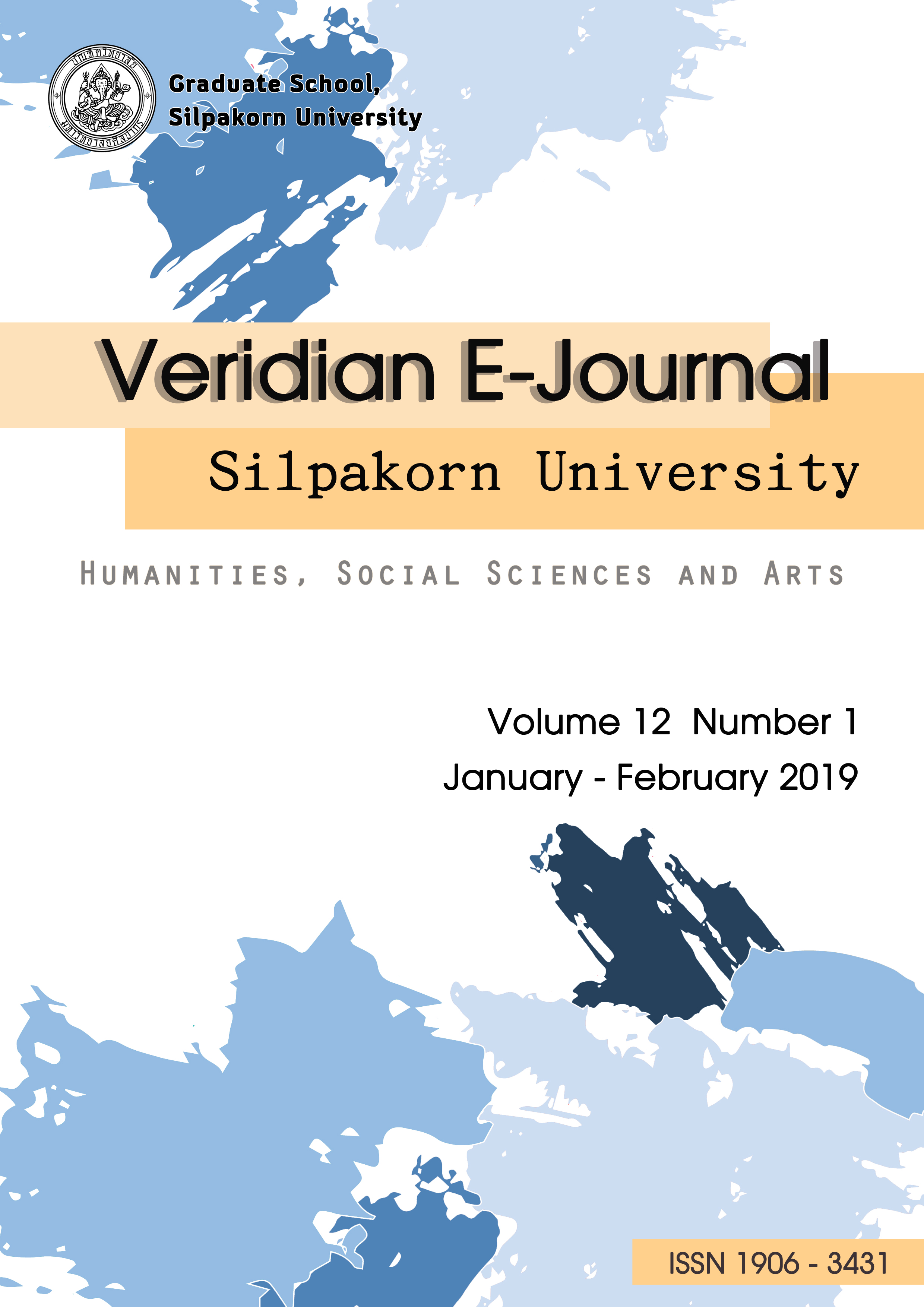การปฏิรูปการเปิดเสรีทางการลงทุนของประเทศเมียนมาร์ (Myanmar’s Investment Liberalization Reforms)
Main Article Content
บทคัดย่อ
จุดเปลี่ยนทางโครงสร้างเศรษฐกิจที่สำคัญของประเทศเมียนมาร์เริ่มต้นจากการปฏิรูปการเมืองการปกครองที่เข้าสู่ระบอบประชาธิปไตยมากยิ่งขึ้นในปี ค.ศ. 2012 ซึ่งก่อนหน้านี้ เมียนมาร์อยู่ภายใต้การปกครองของรัฐบาลทหารถึง 50 ปี จึงทำให้ประเทศต้องเผชิญกับภาวะเศรษฐกิจตกต่ำประกอบกับประเทศถูกคว่ำบาตรทางเศรษฐกิจจากชาติตะวันตก ด้วยเหตุนี้ การปฏิรูปเศรษฐกิจจึงเป็นเป้าหมายหลักของรัฐบาลใหม่ที่จะสนับสนุนการพัฒนาเศรษฐกิจของประเทศโดยเน้นการเปลี่ยนแปลงโครงสร้างทางเศรษฐกิจจากภาคการเกษตรสู่ภาคอุตสาหกรรม บทความวิชาการชิ้นนี้ นำเสนอมุมมองผลกระทบของกระบวนปฏิรูปการเมืองและเศรษฐกิจต่อการลงทุนโดยเสรีในประเทศเมียนมาร์ รวมถึงนโยบายการลงทุนใหม่ของรัฐบาล ซึ่งกระบวนการเหล่านี้อาจไม่สัมฤทธิ์ผลหากรัฐบาลเมียนมาร์ไม่สามารถผลักดันนโยบายดังกล่าวให้มีผลต่อการพัฒนาเศรษฐกิจของประเทศอย่างยั่งยืนได้ สุดท้าย บทความวิชาการนี้นำเสนอผลกระทบของการดำเนินนโยบายเปิดเสรีทางด้านการลงทุนโดยตรงต่อการพัฒนาเศรษฐกิจของประเทศเมียนมาร์ รวมถึงโอกาสและความท้าทายที่อาจจะเกิดขึ้นในอนาคต
The objectives of this study is to offer an analysis of Myanmar’s investment liberalization reforms on how political and economic reforms impact the investment in Myanmar. Moreover, it tends to focus on what the specific investment policy are currently underway. Lastly, what we need to understand, therefore, is the impact of the new investment policy on the sustainable economic development in Myanmar, as well as what the rights challenges are. First-hand resources and secondary materials are used to support the study of Myanmar’s investment liberalization reforms.
The study shows that the political reforms of Myanmar in 2012 have affected on an opening a free market of an investment in the country. The government of Myanmar has supported an investment from the private sectors by enforcing the new laws to control investment both domestically and internationally, especially the amendment of the new investment laws to support the investment in the industrial sector, as well as, hiring local employees. Furthermore, the government has also established an industrial zone and reformed the banking system in Myanmar. As a result of an increasing of investment, especially from the west and other countries, the economic structure of the country has gradually transformed to be based on primary industrial sector.
Article Details
เอกสารอ้างอิง
จิรามน สุธีรชาติ และ นิธิ กวีวิวิธชัย. (2560, 5 กรกฎาคม). EIC ชี้เมียนมาเร่งเครื่อง ปรับกฎการลงทุนฉบับใหม่ ปลดล็อกดึงต่างชาติ. Thaipublica. สืบค้นเมื่อ 2 พฤษภาคม 2561 จาก https://thaipublica.org/2017/07/eic-myuanmar-5-7-2560/.
ชลัญธร โยธาสมุทร. (2560, 3 มิถุนายน). สัมภาษณ์พิเศษ เลขาธิการ คกก.ส่งเสริมการลงทุนเมียนมา: ทำธุรกิจในเมียนมาไม่ใช่เรื่องยาก. Thai PBS. สืบค้นเมื่อ 2 พฤษภาคม 2561, จาก https://news.thaipbs.or.th/content/263090.
นิธิกานต์ คุณาศิรินทร์. (2559). การปฏิรูปทางการเงินของเมียนมาร์. ส่วนเศรษฐกิจภาค สำนักงานภาคเหนือ ธนาคารแห่งประเทศไทย. สืบค้นเมื่อ 2 พฤษภาคม 2561 จาก https://www.bot.or.th/Thai/MonetaryPolicy/EconMakhongCanelArea/Myanmar/Article/.pdf.
ศูนย์พัฒนาการค้าและธุรกิจไทยในประชาคมเศรษฐกิจอาเซียน. (2557). ข้อมูลด้านการลงทุน. สำนักงานส่งเสริมการค้าระหว่างประเทศ ณ กรุงย่างกุ้ง เมียนมาร์ กรมส่งเสริมการค้าระหว่างประเทศ. สืบค้นเมื่อ 2 พฤษภาคม 2561 จาก https://www.ditp.go.th/main.php?filename=mm_invest.
สำนักงาน ก.พ. (2558, 1 กรกฎาคม). นโยบายการลงทุนจากต่างชาติของเมียนมาร์หลังการปฏิรูปประเทศ. ศูนย์ข้อมูลอาเซียน กรมประชาสัมพันธ์. สืบค้นเมื่อ 2 พฤษภาคม 2018 จาก https://www.aseanthai.net/ewt_news.php?nid=5922&filename=aseanknowledge.
ส่วนบริหารงานทวิภาคี สำนักอาเซียน. (2557, กุมภาพันธ์). นโยบายการลงทุนจากต่างชาติของเมียนมาร์ภายหลังการปฏิรูปประเทศ. กรมเจรจาการค้าระหว่างประเทศ. สืบค้นเมื่อ 2 พฤษภาคม 2018 จาก https://www.thaifta.com/thaifta/Home.
ภาษาต่างประเทศ
Htin, L. H. (2016, July 20). FDI could exceed MIC’s target in 2017-18, but still lower than previous years’. The Myanmar Times. Retrieved May 19, 2018, from https://www.mmtimes.com/business/26883-fdi-could-exceed-mic-s-target-in-2017-18-but-still-lower-than-previous-years.html.
Bader, A. J. (2012, November 9). Prospects of Political Reforms in Myanmar. Brookings. Retrieved from https://www.brookings.edu/opinions/prospects-of-political-reforms-in-myanmar/.
Chow, C. G. (2015). China’s Economic Transformation. 3rd ed. West Sussex: Wiley Blackwell.
FFP. (2014, May 13). The Indicators. Retrieved from https://ffp.statesindex.org/indicators.
Leftwich, A. (2008). Andrea Leftwich, Theorizing the State: Politics in the Developing World (Burnell, P. & Randall, V, Eds.). New York: Oxford University Press.
Mahtani, S. (2014, January 30). Foreign Telecoms Granted Licenses in Myanmar. The Wall Street Journal. Retrieved May 19, 2018, from https://online.wsj.com/news/articles/SB10001424052702303743604579352310422552966.
Matsui, M. (2014, March 3). Manufacturers leading foreign investment charge in Myanmar. Nikkei Asian Review. Retrieved May 19, 2018, from https://asia.nikkei.com/Business/Trends/Manufacturers-leading-foreign-investment-charge-in-Myanmar.
Kawasaki, S. (2013, March 26). Myanmar seeks Japan FDI to aid agriculture, economic reforms. The Japan Times News. Retrieved May 19, 2018, from https://www.japantimes.co.jp/news/2013/03/26/business/myanmar-seeks-japan-fdi-to-aid-agriculture-economic-reforms/#.U53sI3KSxDI.
Roberts, J. (2013, October 7). Burma struggles to attract foreign investment. World Socialist. Retrieved from https://www.wsws.org/en/articles/2013/10/07/burm-o07.html.
World Bank Group. (2016). Myanmar economic monitor: Anchoring economic expectations (Working Paper No. 112317). Retrieved from https://documents.worldbank.org/curated/en/271301485510327677/Myanmar-economic-monitor-anchoring-economic-expectations.

